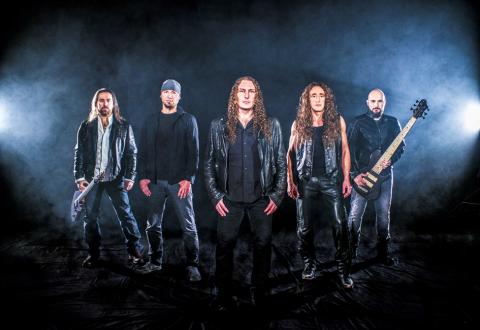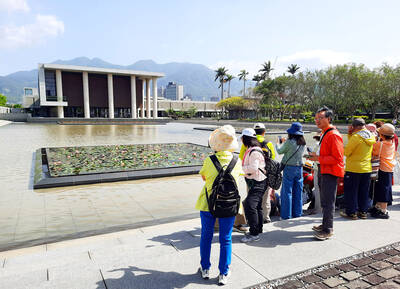Breaking up is hard to do. Or so it seems.
In music, the parting of ways is made all the more complicated when the warring factions can’t agree on what belongs to who.
Much like a divorcing couple with a throw rug that really ties the room together, band members in the midst of a split have to find some means, amicable or otherwise, of deciding who keeps the name, the music, the legacy.

Photo courtesy of AFM Records
Things can get ugly, not the least of which when it comes to the name. People are petty creatures, loathe to give up that which they’ve earned or that which they simply believe they’ve earned. It’s rarely cut and dry.
Bands are creative collectives. Unless it’s a solo virtuoso with a bunch of hired guns, chances are the name, the music and the legacy were curated by the whole.
So, when the whole implodes, which shattered remnants does everyone get to gather up and take home?
In the case of the name, there’s a gray area wherein those jilted from the original tweak the moniker just enough to keep a semblance of ingenuity while at the same time holding onto that which they (ostensibly) worked so hard to build.
Forgoing the hilarity that has surrounded the multiple incarnations of hair metal disasters such as LA Guns and Ratt, a lack of willingness to sever ties with a legacy and create something new is why we have Venom and the offshoot Venom Inc. It’s why we have Entombed and Entombed AD. And, on the surface of things, it’s why we have Rhapsody of Fire and Luca Turilli’s Rhapsody. But this is one instance where there is actually more than meets the eye.
Formed in 1993 by symphonic-minded guitar god and sweep arpeggio aficionado Turilli and keyboardist/composer Alex Staropoli, the Italian neo-classical power metal force Rhapsody of Fire have seen much of the music industry’s ugly cheek over the past two-plus decades.
Together, Turilli and Staropoli made a formidable duo, Turilli giving the band (in the beginning known as Rhapsody) its Yngwie Malmsteen-esque shred credibility, with Staropoli providing the varied levels of orchestral grandeur. Throw in the imposing range of vocalist Fabio Lione, and all the makings of an epic power metal powerhouse were in play.
Rhapsody enjoyed critical acclaim until a dispute with former label Mystic Circle Music (run by Manowar bassist and songwriter Joey DeMaio) in the mid-aughts forced a hiatus and name change.
The band returned as Rhapsody of Fire in 2010, but by August of 2011, Turilli was out, going on to form his own version of the band along with ousted bassist Patrice Guers. Thus the world was left with yet another instance of a band with two founding members leading two different interpretations of a once shared vision.
In the post-split era, Turilli would draw first blood. Rhapsody of Fire’s first album following the breakup, Dark Wings of Steel, was largely viewed as a flop. Meanwhile, Turilli played the part of the cuckolded divorcee having the last laugh when his first foray under the Luca Turilli’s Rhapsody name, Ascending to Infinity, was hailed as a triumph.
Though the ax man’s departure was said to be friendly, the fact that the “Rhapsody” portion of both band’s logos was and is virtually identical, along with Turilli’s name appearing on the cover of Ascending to Infinity in text that is microscopic by comparison, pointed to a definite lack of will to leave the past behind, though this could well have been a marketing ploy by the respective artists’ competing labels.
Now that both bands are two albums removed from the split, perhaps everyone can well and truly move on. Following the their initial misstep, Staropoli and the reinvigorated Rhapsody of Fire have rebounded with their latest effort, Into the Legend.
Released in January, the 70-minute epic of galloping Tolkien-esque fantasy is in every sense a return to the form of the band’s early days. Back are the choruses drenched in choral arrangements and, though Turilli’s absence is still notable, as it most likely always will be, the arpeggio sweeps would still make Malmsteen himself blush.
All the fantastical power metal hallmarks are present. There is the ballad, the 16-minute closing epic, the speed metal fury and dense orchestral tracking. Through it all Lione battles on, voice showing some wear in places. But he’s gruff when needed, soaring like a Eurobeat Bruce Dickinson through the majority.
The danger in there being essentially two versions of the same band emerging following a split is that the offshoots will tarnish the legacy of the original. That, or the progeny of the Alpha goes on to become little more than a cover band, leeching off past acclaim (looking at you, Venom Inc), while the Alpha degenerates into a parody of its former glory (looking at you, Venom).
In the case of Rhapsody, if there is such a thing as a best-case scenario, it’s been achieved. Both incarnations, though understandably similar in sound and influence, have emerged as unique entities in their own right.
Bands might not always move on with dignity, and in fact they often do so with anything but. Perhaps surprising to some, a metal band has shown us the way.
■ Rhapsody of Fire plays on Sunday at The Wall, B1, 200, Roosevelt Rd, Sec 4, Taipei City (台北市羅斯福路四段200號B1). Tickets are NT$1,600 in advance, available at 7-Eleven ibon kiosks, NT$1,800 at the door. Doors open at 7:30pm, and the show gets underway at 8pm with opening act Nocturne Moonrise.

When the South Vietnamese capital of Saigon fell to the North Vietnamese forces 50 years ago this week, it prompted a mass exodus of some 2 million people — hundreds of thousands fleeing perilously on small boats across open water to escape the communist regime. Many ultimately settled in Southern California’s Orange County in an area now known as “Little Saigon,” not far from Marine Corps Base Camp Pendleton, where the first refugees were airlifted upon reaching the US. The diaspora now also has significant populations in Virginia, Texas and Washington state, as well as in countries including France and Australia.

On April 17, Chinese Nationalist Party (KMT) Chairman Eric Chu (朱立倫) launched a bold campaign to revive and revitalize the KMT base by calling for an impromptu rally at the Taipei prosecutor’s offices to protest recent arrests of KMT recall campaigners over allegations of forgery and fraud involving signatures of dead voters. The protest had no time to apply for permits and was illegal, but that played into the sense of opposition grievance at alleged weaponization of the judiciary by the Democratic Progressive Party (DPP) to “annihilate” the opposition parties. Blamed for faltering recall campaigns and faced with a KMT chair

Article 2 of the Additional Articles of the Constitution of the Republic of China (中華民國憲法增修條文) stipulates that upon a vote of no confidence in the premier, the president can dissolve the legislature within 10 days. If the legislature is dissolved, a new legislative election must be held within 60 days, and the legislators’ terms will then be reckoned from that election. Two weeks ago Taipei Mayor Chiang Wan-an (蔣萬安) of the Chinese Nationalist Party (KMT) proposed that the legislature hold a vote of no confidence in the premier and dare the president to dissolve the legislature. The legislature is currently controlled

Dull functional structures dominate Taiwan’s cityscapes. But that’s slowly changing, thanks to talented architects and patrons with deep pockets. Since the start of the 21st century, the country has gained several alluring landmark buildings, including the two described below. NUNG CHAN MONASTERY Dharma Drum Mountain (法鼓山, DDM) is one of Taiwan’s most prominent religious organizations. Under the leadership of Buddhist Master Sheng Yen (聖嚴), who died in 2009, it developed into an international Buddhist foundation active in the spiritual, cultural and educational spheres. Since 2005, DDM’s principal base has been its sprawling hillside complex in New Taipei City’s Jinshan District (金山). But